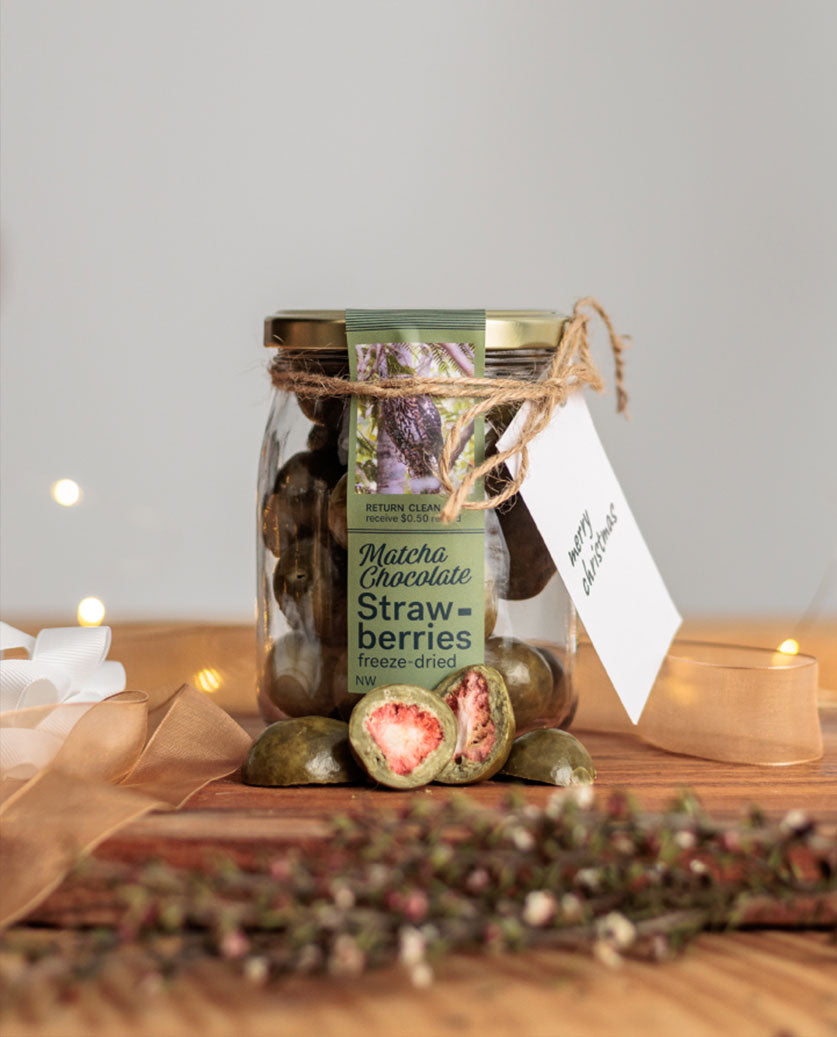Sugars & Sweeteners
Sugar, in all forms, is a simple carbohydrate that the body converts into glucose and uses for energy. But the effect of sugar on your body and overall health depends on the type of sugar. Below we discuss the difference between natural sugar, refined sugar and artificial sugar, including our choice of natural sugars not only for health reasons, but for their delicious flavour too!

Natural Sugars
Natural sugars are those that are found naturally in food like fruit, vegetables, dairy products, grains, and even nuts and seeds to some extent. These natural sugar sources not only provide an effective energy source, but they also come bundled with plenty of fibre, water, vitamins, minerals and antioxidants. This is important for health because fibre slows how quickly sugar enters your bloodstream, thereby reducing your likelihood of blood sugar spikes. These nutrient-rich natural sugar sources are your best choice of dietary sugar input as they provide a greater contribution to your daily nutrient intake when compared to foods with added refined sugars.
Refined Sugars
Refined sugars are created by processing foods like corn, sugar cane and sugar beets. This chemically processed sugar is typically added to food and drink to improve taste. It should be thought of as "empty calories" because, unlike natural sugars, it contains virtually no nutritional goodness like fibre, vitamins and minerals. Instead, it quickly enters your bloodstream and may cause unhealthy blood sugar and insulin spikes. In addition to being low in nutrients, refined sugars may also be rich in salt and added fats, both of which can have a negative health impact when consumed in high amounts. The most common refined sugar to look out for and avoid is high fructose corn syrup.
Artificial Sweeteners
Quite possibly the worst of the lot, artificial sweeteners are said to be ‘lite’ but may leave a heavy burden on your health. The most common culprits are sucralose (aka Splenda) and aspartame, often found in fizzy drink, biscuits, sweets and the like. According to studies, these chemical sweeteners may actually change the bacterial makeup of your microbiome, which can be a trigger for autoimmune problems and metabolic disorders. There is research to show that regular consumption of artificial sweeteners may increase risk of developing type 2 diabetes (1).
Our Pick of Sweeteners
Here at GoodFor we are big believers in the health-promoting power of a whole foods diet, including sugar in its most whole and natural form. Here are some of our faves & why we like them:
Dates - High in health-promoting minerals and dietary fibre, snack on these sweet delights on their own or use to sweeten your baking for a caramel-like texture.
Dried Apricots - Packed with naturally-occurring fructose and without preservatives, dried apricots are a wonderful source of iron, potassium and calcium. Use for added sweetness and moisture in both sweet and savoury dishes.
Dried Figs - With a texture that combines the chewiness of their flesh with the crunchiness of their seeds, figs will naturally sweeten recipes like energy bars, bliss balls, muffins and loaves.
Coconut Sugar - This is simply the evaporated nectar from the flower of organically grown coconut palm trees. With its sweet, malty, wholesome deliciousness, coconut sugar has a low GI and won't spike your blood sugar levels.
Maple Syrup* - Lower in calories than many other natural sweeteners, maple syrup not only offers up a distinctive sweet flavour, it is also a great source of manganese, an anti-inflammatory mineral that offers energy and antioxidants.
Manuka Honey* - With next-level antimicrobial benefits that keep your immune system in check, Manuka Honey is not only a delicious sweetener but also can be considered an effective natural remedy for many skin and immune conditions.
Panela Sugar - Panela is traditional, pure, unrefined, whole cane sugar. It is basically a solid piece of sucrose and fructose obtained from the boiling and evaporation of organic sugar cane juice. Therefore, panela contains all the authentic nutrients present in sugar cane juice and this is why it has been crowned as one of the more wholesome sugars in the world.
Rapadura Sugar - Made simply from the juice of organically grown sugar cane, the molasses of the sugar cane juice is not separated during this process, and no chemicals are involved. This rapadura sugar has a unique caramel flavour.

*Item not available online but is available in your local GoodFor store.
1. Fagherazzi G, Gusto G, Affret A et a. Chronic Consumption of Artificial Sweetener in Packets or Tablets and Type 2 Diabetes Risk: Evidence from the E3N-European Prospective Investigation into Cancer and Nutrition Study. Ann Nutr Metab. 2017;70(1):51-58. Retrieved from: https://www.ncbi.nlm.nih.gov/pubmed/28214853
 GoodFor
GoodFor

